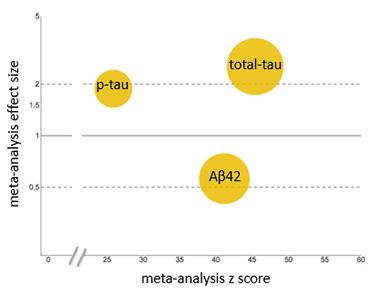Meta-Analysis of 21 Years of Alzheimer's Fluid Biomarker Research
Quick Links
In today’s Lancet Neurology, researchers led by Bob Olsson at the University of Gothenburg, Sweden, report the most comprehensive meta-analysis of Alzheimer’s disease fluid biomarkers to date. Compiling data from hundreds of studies covering tens of thousands of cases and controls, Olsson and colleagues analyzed 15 CSF and plasma biomarkers associated with Alzheimer’s or more broadly with neurodegeneration. The researchers found four with strong effect sizes, and four with moderate influence. Data from the study are curated in Alzforum’s open-access AlzBiomarker database, and will be the subject of an Alzforum webinar on April 29.

Since the early 1990s, researchers have published reams of data on AD biomarkers, most notably on CSF analysis of Aβ42, tau, and phospho-tau. A comprehensive meta-analysis has been lacking, however, in part because data on absolute concentrations of markers in the CSF and plasma vary widely. Olsson and colleagues avoided this complication by focusing on case-control ratios of marker levels, essentially using the fold change reported in each study. After an exhaustive review of 30 years of biomarker literature, starting with the first NINCDS-ADRDA criteria of Alzheimer’s disease (McKhann et al., 1984) and ending in June 2014, the researchers identified 231 studies, covering 15,699 AD patients and 13,018 controls, that met inclusion criteria for their meta-analysis.
Four CSF markers—total tau, neurofilament light chain, phospho-tau, and Aβ42—emerged as the most robust. AD-control ratios hovered around 2.0 for the first three, whereas Aβ42 was found to drop in AD CSF to almost half (0.56) the levels in controls. Four other biomarkers had moderate effect sizes, with ratios near 1.5. They are neuron-specific enolase, visinin-like protein 1, heart fatty acid-binding protein, plus the glial activation protein YKL-40. No marked differences between AD and controls emerged for seven other markers. They included Aβ38, Aβ40, sAPPα and β, MCP-1, GFAP, and the CSF-plasma ratio of albumin. Among all plasma biomarkers analyzed, only total tau significantly associated with AD. CSF Aβ42, total tau, and phospho-tau also distinguished mild cognitive impairment due to AD from stable MCI.
Researchers can explore the analysis on the interactive AlzBiomarker database, which will be updated periodically. The other principal investigators of this study are Henrik Zetterberg and Kaj Blennow at the University of Gothenburg; co-authors include Alzforum staff involved in building and curating the database.—Tom Fagan
References
Webinar Citations
Paper Citations
- McKhann G, Drachman D, Folstein M, Katzman R, Price D, Stadlan EM. Clinical diagnosis of Alzheimer's disease: report of the NINCDS-ADRDA Work Group under the auspices of Department of Health and Human Services Task Force on Alzheimer's Disease. Neurology. 1984 Jul;34(7):939-44. PubMed.
Other Citations
Further Reading
Papers
- Tarawneh R, D'Angelo G, Crimmins D, Herries E, Griest T, Fagan AM, Zipfel GJ, Ladenson JH, Morris JC, Holtzman DM. Diagnostic and Prognostic Utility of the Synaptic Marker Neurogranin in Alzheimer Disease. JAMA Neurol. 2016 May 1;73(5):561-71. PubMed.
- DeKosky ST, Golde T. Cerebrospinal Biomarkers in Alzheimer Disease-Potential Roles as Markers of Prognosis and Neuroplasticity. JAMA Neurol. 2016 May 1;73(5):508-10. PubMed.
- Wellington H, Paterson RW, Portelius E, Törnqvist U, Magdalinou N, Fox NC, Blennow K, Schott JM, Zetterberg H. Increased CSF neurogranin concentration is specific to Alzheimer disease. Neurology. 2016 Mar 1;86(9):829-35. Epub 2016 Jan 29 PubMed.
Primary Papers
- Olsson B, Lautner R, Andreasson U, Öhrfelt A, Portelius E, Bjerke M, Hölttä M, Rosén C, Olsson C, Strobel G, Wu E, Dakin K, Petzold M, Blennow K, Zetterberg H. CSF and blood biomarkers for the diagnosis of Alzheimer's disease: a systematic review and meta-analysis. Lancet Neurol. 2016 Jun;15(7):673-84. Epub 2016 Apr 8 PubMed.
Annotate
To make an annotation you must Login or Register.

Comments
No Available Comments
Make a Comment
To make a comment you must login or register.